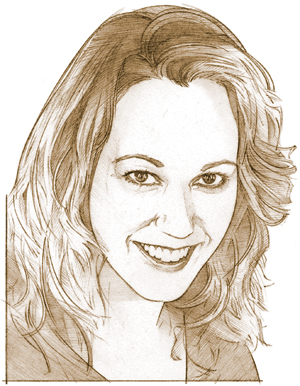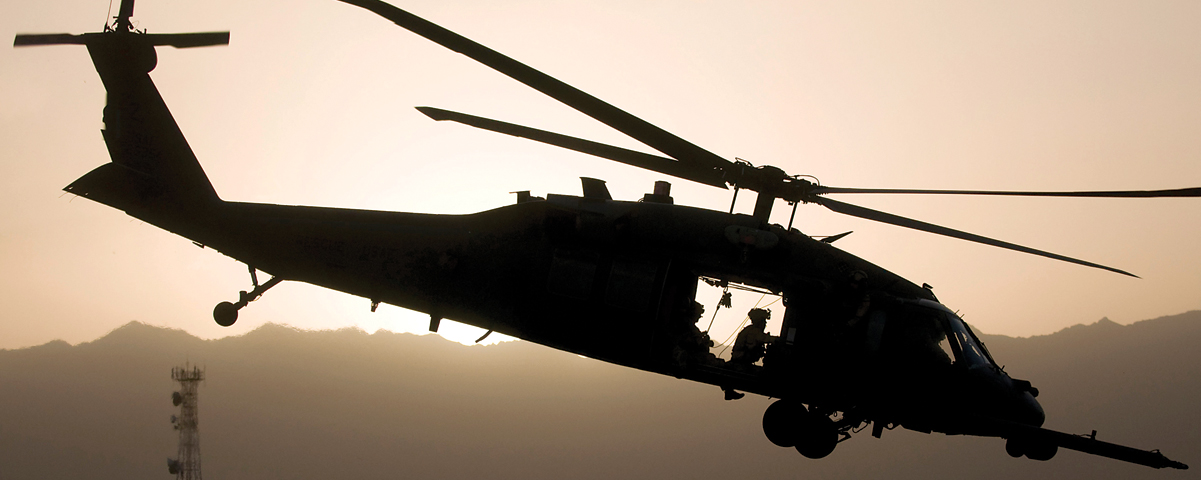
On July 29, 2009, while attempting a medevac rescue in Afghanistan, the HH-60 Pave Hawk rescue helicopter Major Mary Jennings Hegar was co-piloting came under enemy fire. Though both Hegar and pilot Lt. Col. George Dona were wounded, they effected the rescue. Due to fuel loss from the attack, however, they were forced to land 2 miles away. The crew then transferred the patients to another helicopter, ensuring their survival. For her actions in defense of both her crew and patients Hegar received the Distinguished Flying Cross with Valor Device—only the second ever awarded to a woman. The Air Force veteran began her career in aircraft maintenance and was selected for pilot training with the Air National Guard in 2004. She served three tours in Afghanistan on combat search and rescue and medevac missions. In 2017 Hegar published her memoir, Shoot Like a Girl: One Woman’s Dramatic Fight in Afghanistan and on the Home Front, which TriStar has optioned for a film.
Tell us about being shot down.
At the time we doing our job and completely focused on our patients and protecting each other. It didn’t sink in until days later what had happened.
Spiritually, it was very impactful to me. I had developed this agnostic, “chaos reigns” view of the universe. But you can’t hold on to that view when you experience what we did in Afghanistan. There were easily four or five times we should have died but didn’t.
How do you feel about receiving the DFC and Purple Heart?
It’s an honor to receive the DFC, especially with the Valor Device. As a rescue pilot, you do a lot of things that people would consider acting with valor, but it is your job. Saying that we went above and beyond what is already a high standard is a tremendous honor.
In addition to the medals, feedback from fellow soldiers means the world to me. On one mission we went in to pick up a wounded Danish soldier. We got a radio call from the soldier’s commander saying that we had given his troops inspiration. It was touching to hear the commander describe how it turned the tide of that battle—his weary soldiers were renewed after seeing us rush into the firefight to rescue the wounded.
Why did you sue the Pentagon over the exclusion of women from combat?
When I could no longer fly because of an injury, the only other job I would have wanted was special tactics officer [a field position that coordinates air support for ground troops]. I would have been perfectly suited for that position, because I was battle-proven and composed under fire. But because I’m a woman, I couldn’t apply for it.
I might have retired and said, “The Air Force missed out on having a great STO.” However, about the time I was considering this, my stepdaughter told me she wanted to be a Marine. A few days later she came back in tears because someone told her she couldn’t be a Marine, because “it’s a boy’s job.” That sealed the deal. When the ACLU called me the next day, I didn’t hesitate to say yes to being part of the lawsuit.
How do you respond to those who think women shouldn’t serve on the front line?
That opinion comes from a lack of experience with women like me. Often the person is thinking about a mother or a wife who they don’t think would be able to hold their own in combat. They don’t have experience with women who have fought valiantly in combat.
I’ve had people say things like, “We don’t want our country’s mothers, daughters, wives, sisters coming home in body bags.” That’s a telling argument, because it says who the speaker thinks women are and what role women are supposed to serve in society. Men are allowed to be individuals, whereas women are thought of in the roles we do to support men. We’re more than that. We’re also individuals with dreams and capabilities and something to contribute.
Do women and men serving together change the team?
Right now we’re talking about men and women, but it was the same question when the military integrated racially. Opponents made the same “unit cohesion” argument. I’ve seen women integrated into units the right way, and I’ve seen the absolute wrong way.
During the lawsuit it was a military effectiveness issue. Commanders would know a woman who had the best skills or a certain experience and needed those women in the field. To get around the exclusion, commanders would attach women to male units.
The problem is those men and women didn’t know each other. When you have a combat unit, where people are depending on the person next to you, it is a problem when that person is a stranger. You don’t trust them, you don’t know what training they’ve had, you haven’t seen them in a tough situation. That is not the way to sow trust.
I trained with, lived with, ate with and deployed with the men. They had no reason not to trust me. The women in my unit were completely integrated, and unit cohesion was very high.
Were you ever treated differently?
There was one instance in Afghanistan when a female patient began to cry. My gunner turned to me and said, “This is why we shouldn’t let women on convoys.” Yet, there I was covered in fuel and blood, explaining that it wasn’t her gender causing her to cry but the fact that she hadn’t had any experience in combat.
I found that if a man did something like losing his nerve, that was attributed to the individual. But if a woman did something similar, it was, “Women can’t do this.” It was attributed to all women.
What inspired the title of your book, Shoot Like a Girl?
One time on the firing range the instructor told me that I shot like a girl. At first I got my feathers ruffled a little. I fired back, “What are you talking about? I’m scoring ‘expert’ every time I shoot.” He said, “Exactly. It’s a compliment to say that you shoot like a girl.”
Women are frequently better shooters because of our cardiovascular system, our breathing and our center of gravity. I feel empowered as a woman. I believe my femininity is a strength. Shoot Like a Girl refers to harnessing your power and strength instead of trying to cover up your weaknesses.
What would you like to see for the future of women in the military?
I would like gender not to be part of their description—that they are not a “female tank driver” or a “female artillery troop”—it’s just their job.
Should basic physical ability standards be lowered to allow more women to serve in the nation’s military?
I am adamantly against lowering any type of standard for women in the armed services. The point has always been that if a woman can meet the standard and do the job, it should be open to her.
That said, the standards need to be job-specific. If you need to be able to carry a 200-pound person out of a vehicle, then you train people to drag a 200-pound dummy or bag of sand away from a vehicle. Don’t say that 45 push-ups and 12 pull-ups equate to being able to drag a 200-pound person out of a vehicle.
What about requiring women to register for the draft?
Anyone who says women shouldn’t sign up for the draft is implicitly stating women should be protected and should be thought of as weaker. If we want to be thought of as equal, then we have to stand up and give as much as anybody else. MH





